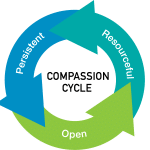
How To Communicate with Compassion During Crisis
Share viaI travel quite a bit, so I’ve been paying attention to how the airlines are responding to the coronavirus crisis. I’ve gotten emails from the three airlines I use most, Delta, American, and United. Crisis communication requires compassion, which was notably absent in these messages.
All of the notifications conveyed two basic messages;
- We know safety is important so here’s what we are doing about it. (Information)
- Here’s why you can still trust us. (Commitments)
Here are the opening and closing paragraphs for each email I received. I’ve left out the parts listing the specific actions each airline is taking since they are essentially identical. Information parts are coded Blue, and Commitments are in Purple.
Delta (Ed Bastain, CEO)
As a valued member of the Delta family, I appreciate the trust you place in us and our people worldwide when you travel.
In the current environment, it’s important for all of us to travel smarter and more consciously. That’s why I want to personally update you on the situation with COVID-19 (the coronavirus) and the steps we are taking to ensure your health and safety in your travels.
(Here they list all the steps they are taking)
I believe Delta’s mission of connecting the world and creating opportunities is never more important than at times like this.
Thank you for your continued trust in Delta, and I look forward to seeing you in my own travels throughout the year.
American (Kurt Stache, SVP, Customer Experience)
Your safety and well-being is always our top priority at American Airlines, but particularly in relation to the coronavirus (COVID-19). Providing you with up-to-date information on what we are doing to respond to the issue is a critical step in giving you peace of mind when you travel. Here are a few highlights of our efforts:
(Here they list all the steps they are taking)
We are confident that our incredible team of more than 130,000 will care for you in the best possible way during your journey with us.
United (Oscar Munoz)
I consider you part of our United family and your safety remains our highest priority.
We are in the business of serving people and in the midst of this coronavirus outbreak it’s important that we give you as much flexibility as possible when planning your next trip. But it’s also important that we give you as much information as possible about the procedures we follow to clean our aircraft and maintain a sanitary environment once we’re in the air.
(Here they list all the steps they are taking)
I want you to know that you can continue to rely on us. So, the next time we have the privilege of welcoming you aboard our aircraft, you can know our commitment to you remains as steadfast as ever.
Lack of Compassion in Crisis Communication
What’s consistently missing in these crisis communication emails is openness, the foundation for compassion. None of these top leaders make an emotional connection with their constituents. There is no empathy for the feelings of anxiety and fear and no acknowledgment of the vulnerability we all feel. United and Delta make a broad statement about “family” but show no effort to connect at a personal level.
People don’t care how much you know until they know how much you care.
Compassionate communication requires transparent information exchange, and solid commitments to behavior, but first and foremost is an emotional connection that acknowledges the human connection we all have. Why? Because it is this connection that get us through the crisis together instead of falling apart.
 The Compassion Cycle provides a framework for communicating during crisis while including all aspects of compassion.
The Compassion Cycle provides a framework for communicating during crisis while including all aspects of compassion.
Openness: Make an emotional connection. Most importantly during crisis is to name the anxiety and fear and connect personally with it so that people get the message, “You aren’t alone and you feelings matter.”
Resourcefulness: Active, informed problem-solving. All three airlines did a great job of this. Even better, give us travelers things we can do to lower our risk and partner with you in the solution. This helps us feel more in control during times of uncertainty.
Persistence: Be trustworthy. Be trustworthy. Be trustworthy. Be honest, be dependable, and be consistent. We all need to know what to expect from you.
Want help applying our compassion template to your crisis communication strategy? Call us for a free 30 minute consultation. +1 316 283 4200, email info@next-element.com
Ideal compassionate communication from any airline would have read like this;
I can imagine that you are anxious and afraid about travel safety in the wake of the coronavirus outbreak. This is perfectly normal and we are in this together. Our loved ones are also traveling. We are here for you because you are part of our family.
Here is the most up-to-date information we know, and these are the steps we are taking to ensure your continued safety and comfort.
Our mission is ___________. Our commitment to you is__________. You can count on us to uphold these values during this crisis.
I appreciate how difficult it is to communicate effectively in times of crisis and uncertainty. If you are struggling to find the right approach, use ORP (Open-Resourceful-Persistent) to do it with compassion. We are committed to teaching you effective communicating strategies so you can feel more confident during turbulent times.
If you need help, give us a call.
Mr. Munoz, Mr. Bastain, and Mr. Stache, the first consultation is on me!
Want help applying our compassion template to your crisis communication strategy? Call us for a free 30 minute consultation. +1 316 283 4200, email info@next-element.com
Copyright Next Element Consulting, LLC 2020
Are travel restrictions are keeping you in your office? Take advantage of our VIRTUAL training, consulting and coaching programs.
Next Element’s training programs were built for RIGHT NOW. Never has the need for compassionate leadership and healthy conflict negotiation been more important.
- No travel needed: Virtual instructor led via webinar
- Quick: Two hour courses
- Practical: Immediately applicable skills
- Cost-Effective: Digital materials, volume discounts
- Rapid Scaling: Virtual certification allows large-scale deployment within days or weeks.
Book Your Next Keynote Speaker

Author and Co-founder of Next Element, Dr. Nate Regier is available to speak at your upcoming event.
Submit a Speaker RequestPodcast: Listen to Nate "On Compassion"
 Listen to the Podcast
Listen to the Podcast



3 Comments
Spot on, Nate!
I’ve been wondering why the similar communications I received from all the big hotel chains left me feeling blahhh! You’ve nailed it.
Thank you Ken. We are offering free 30 minute consults to businesses who want to apply this template to their crisis coms strategy.
Add comment
Add comment
Thank you so much. Remarkable helpful, simple yet challenging. I’m printing this out to ensure I review it frequently.
Be safe and thank you!
Thank you for your kind words, Pam. We are offering free 30 minute consults for any company wanting to apply this template in their coms strategy. Share the word!
Add comment
Add comment
Here are the key components of organizational empathy and how to effectively communicate them to the employees. It’s more important than ever to be considerate and empathetic in how and what we communicate. Compassionate communication requires transparent information exchange, and solid commitments to behavior.
Add comment
Add comment